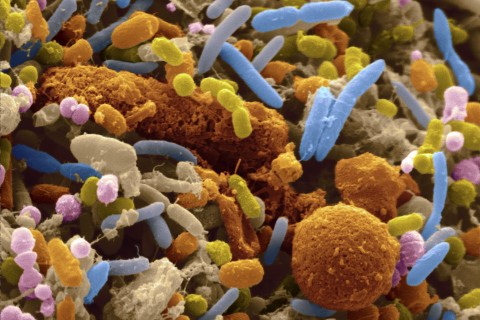|
By Ian MacArthur
Communication between members of different species belonging to the same biological class is complicated, as anyone who has ever attempted to talk to a household cat or dog could relate. It would seem, then, that communication between species belonging to different biological kingdoms, the second broadest classifiable category of species, would be all but impossible. Contrary to this intuition, researchers at the University of East Anglia (UEA) in the United Kingdom have found evidence of communication between our cells and the bacteria residing in our gut. It has long been known that beneficial bacteria living in the human intestine have played a vital role in human health and nutrition. Until now, though, evidence of communication between the organisms last sharing a common ancestor 3.5 billion years ago has been lacking. This communication appears to be related to the bacterial digestion of the phosphorus-containing compound phytate into phosphate and inositol, which are essential for human nutrition. The primary mode of phosphorus storage in plants is in the form of phytate. Humans lack the enzymes to digest phytate and therefore require intestinal bacteria to provide for its degradation before being able to use the essential nutrients the compound offers. The UEA researchers were able to identify a species of prominent gut bacteria as a producer of phytase, a family of phytate-degrading enzymes, and to elucidate the mechanism by which phytate is digested. The bacteria package phytase in special vesicles termed outer membrane vesicles (OMV) and secrete them into the lumen of the colon. There, the OMVs are able to uptake phytate and catabolize it into phosphate and inositol. The contents of the OMVs, including phytase, can then be taken up by colon epithelial cells. The UEA study suggests that phytase is not only significant for its catalytic activity in breaking down phytate but also for its role in communication between bacteria and colon epithelial cells. The investigators observed that calcium signaling in epithelial cells was altered after take-up of OMVs containing phytate. Calcium ions play diverse and important roles in cell signaling pathways. This implies that phytate, by influencing calcium signaling in epithelial cells, is able to influence the behavior of these cells. Although more research must be done to discover the precise details of how calcium signaling is affected by the enzyme, the UEA research has provided a starting point for further understanding the communication between bacteria and human cells. These findings are also significant from a medical standpoint. Human diseases caused by abnormal composition of intestinal bacteria may have a significant basis in how these bacteria communicate with epithelial cells. If future research is able to yield further details of how calcium signaling is affected by phytase uptake from OMVs, therapies may be developed to counteract abnormal bacteria-gut interactions.
0 Comments
Leave a Reply. |
Categories
All
Archives
April 2024
|

